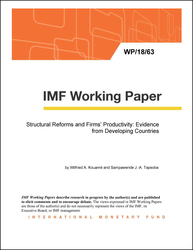
Structural Reforms and Firms’ Productivity: Evidence from Developing Countries
This paper assesses the effects of structural reforms on firm-level productivity for 37 developing countries from 2006 to 2014 period. It takes advantage of the IMF Monitoring of Fund Arrangements dataset for reform indexes and the World Bank Enterprise Surveys for firm-level productivity. The paper highlights the following results. Structural reforms such as financial, fiscal, real sector, and trade reforms, significantly improve firm-level productivity. Interestingly, real sector reforms have the most sizeable effects on firm-level productivity. The relationship between structural reforms and firm-level productivity is nonlinear and shaped by some firms’ characteristics such as the financial access, the distortionary environment, and the size of firms. The pace of structural reforms matters since being a “strong reformer” is associated with a clear productivity dividend for firms. Finally, except for financial and trade reforms, all structural reforms under consideration are bilaterally complementary in improving firm-level productivity. These findings are robust to several sensitivity checks.
Publication date: March 2018
ISBN: 9781484347003
$18.00
Add to Cart by clicking price of the language and format you'd like to purchase
Available Languages and Formats
| English |
Prices in red indicate formats that are not yet available but are forthcoming.
Topics covered in this book
This title contains information about the following subjects.
Click on a subject if you would like to see other titles with the same subjects.
Structural Reforms , Developing countries , Firm Behavior: Empirical Analysis , Project Analysis
Summary
Copyright © 2010 - 2026
Powered by:
AIDC



